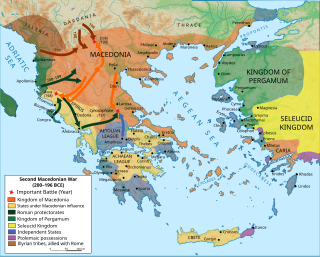Related Research Articles
This article concerns the period 219 BC –210 BC.
This article concerns the period 199 BC –190 BC.

Philip V was king of the ancient Greek kingdom of Macedon from 221 to 179 BC. Philip's reign was principally marked by the Social War in Greece and a struggle with the emerging power of the Roman Republic. He would lead Macedon against Rome in the First and Second Macedonian Wars. While he lost the latter,Philip later allied with Rome against Antiochus III in the Roman-Seleucid War. He died in 179 BC from illness after efforts to recover the military and economic condition of Macedonia and passed the throne onto his elder son,Perseus of Macedon.
The gens Acilia was a plebeian family at ancient Rome,that flourished from the middle of the third century BC until at least the fifth century AD,a period of seven hundred years. The first of the gens to achieve prominence was Gaius Acilius,who was quaestor in 203 and tribune of the plebs in 197 BC.

The Second Macedonian War was fought between Macedon,led by Philip V of Macedon,and Rome,allied with Pergamon and Rhodes. Philip was defeated and was forced to abandon all possessions in southern Greece,Thrace and Asia Minor. During their intervention,although the Romans declared the "freedom of the Greeks" against the rule from the Macedonian kingdom,the war marked a significant stage in increasing Roman intervention in the affairs of the eastern Mediterranean,which would eventually lead to Rome's conquest of the entire region.
The Third Macedonian War was a war fought between the Roman Republic and King Perseus of Macedon. In 179 BC,King Philip V of Macedon died and was succeeded by his ambitious son Perseus. He was anti-Roman and stirred anti-Roman feelings around Macedonia. Tensions escalated and Rome declared war on Macedon.
Publius Sulpicius Galba Maximus was a Roman military officer and Senator who was elected Roman consul twice,and appointed dictator once. He fought in the Second Punic War and the First and Second Macedonian Wars.

Titus Quinctius Flamininus was a Roman politician and general instrumental in the Roman conquest of Greece.

The gens Quinctia,sometimes written Quintia,was a patrician family at ancient Rome. Throughout the history of the Republic,its members often held the highest offices of the state,and it produced some men of importance even during the imperial period. For the first forty years after the expulsion of the kings the Quinctii are not mentioned,and the first of the gens who obtained the consulship was Titus Quinctius Capitolinus Barbatus in 471 BC;but from that year their name constantly appears in the Fasti consulares.

The gens Cornelia was one of the greatest patrician houses at ancient Rome. For more than seven hundred years,from the early decades of the Republic to the third century AD,the Cornelii produced more eminent statesmen and generals than any other gens. At least seventy-five consuls under the Republic were members of this family,beginning with Servius Cornelius Maluginensis in 485 BC. Together with the Aemilii,Claudii,Fabii,Manlii,and Valerii,the Cornelii were almost certainly numbered among the gentes maiores,the most important and powerful families of Rome,who for centuries dominated the Republican magistracies. All of the major branches of the Cornelian gens were patrician,but there were also plebeian Cornelii,at least some of whom were descended from freedmen.
Lucius Quinctius Flamininus was a Roman politician and general who served as consul in 192 BC alongside Gnaeus Domitius Ahenobarbus. He was eventually expelled from the Senate by Cato the Elder.

Attalus I,surnamed Soter was the ruler of the Ionian Greek polis of Pergamon and the larger Pergamene Kingdom from 241 BC to 197 BC. He was the adopted son of King Eumenes I,whom he succeeded,and was the first of the Attalid dynasty to assume the title of king,sometime around 240–235 BC. He was the son of Attalus and his wife Antiochis.
Appius Claudius Pulcher was a Roman politician of the 2nd century BC.

The Laconian War of 195 BC was fought between the Greek city-state of Sparta and a coalition composed of Rome,the Achaean League,Pergamum,Rhodes,and Macedon.

The Roman–Seleucid war (192–188 BC),also called the Aetolian war,Antiochene war,Syrian war,and Syrian-Aetolian war was a military conflict between two coalitions,one led by the Roman Republic and the other led by the Seleucid king Antiochus III. The fighting took place in modern-day southern Greece,the Aegean Sea,and Asia Minor.
Lucius Valerius Flaccus was a Roman politician and general. He was consul in 195 BC and censor in 183 BC,serving both times with his friend Cato the Elder,whom he brought to the notice of the Roman political elite.
Marcus Baebius Tamphilus was a consul of the Roman Republic in 181 BC along with P. Cornelius Cethegus. Baebius is credited with reform legislation pertaining to campaigns for political offices and electoral bribery (ambitus). The Lex Baebia was the first bribery law in Rome and had long-term impact on Roman administrative practices in the provinces.
Cephisodorus or Kephisodoros was a male Greek name.
The gens Villia was a plebeian family at Rome. Its members are mentioned in the first century of the Republic,but the only Villius who obtained the consulship was Publius Villius Tappulus,in BC 199.
The gens Mummia was a plebeian family at Rome. Members of this gens are first mentioned after the Second Punic War,and within a generation,Lucius Mummius Achaicus became the first of the family to obtain the consulship. Although they were never numerous,Mummii continued to fill the highest offices of the state through the third century AD.
References
- ↑ J. C. Yardley (30 July 2009). The Dawn of the Roman Empire. Oxford University Press. pp. 1752–. ISBN 978-0-19-162328-8.
- ↑ Horne, Charles Francis (1905). 5867 B.C.-1906 A.D. National Alumni.
- ↑ Varro
- ↑ Rocca, Samuele (2019-03-18). The legiones Cannenses. Soldiershop Publishing. ISBN 978-88-9327-413-5.
- ↑ Pausanias. Description of Greece, 7.7.9
- ↑ Livy 33, 24, 7.
- ↑ Livy 33, 35 and 33, 39. Polybius 18, 48, 3 and 18, 50, 3.
- ↑ Livy 34, 59; 35, 13–15; 35, 23; 35, 39, 4–8.